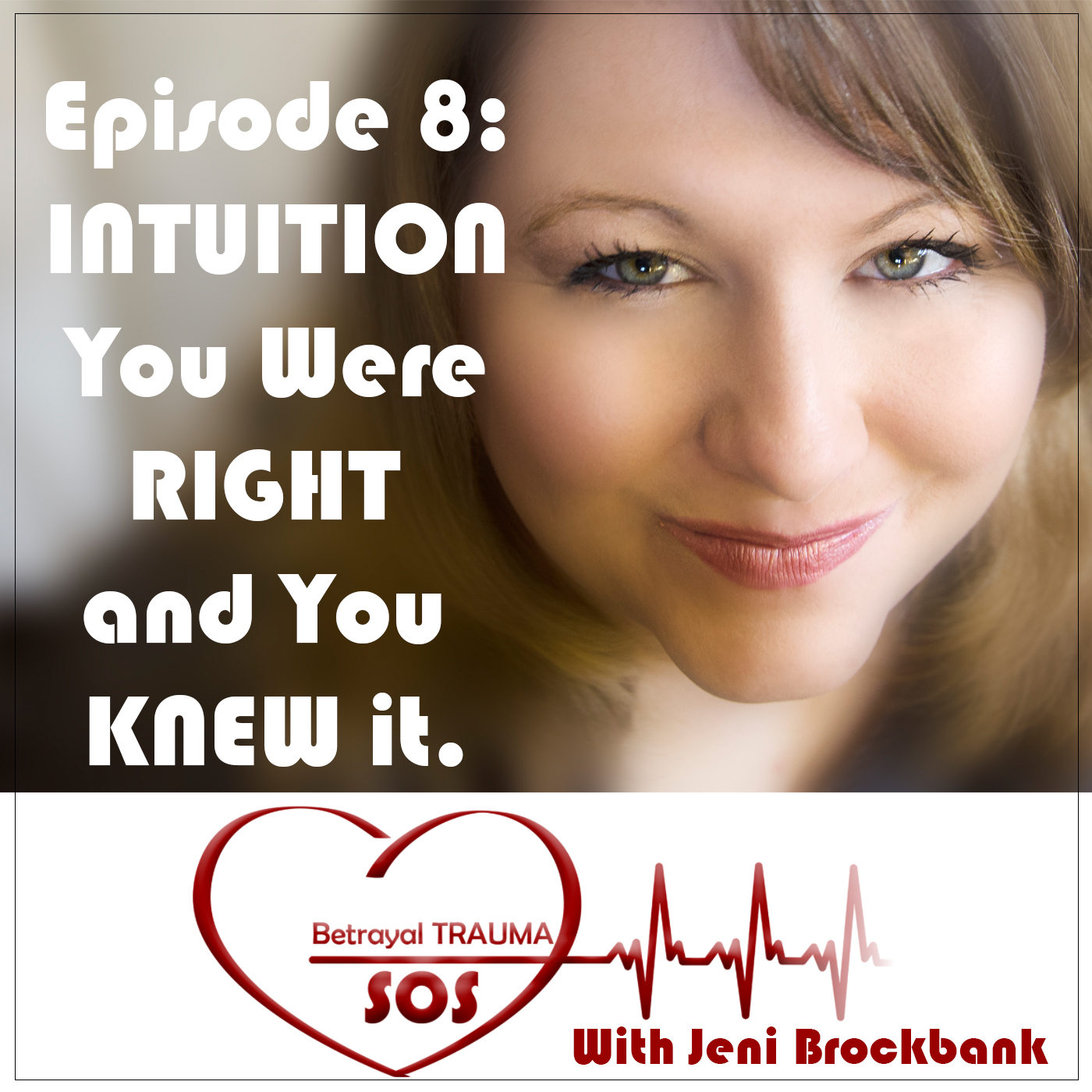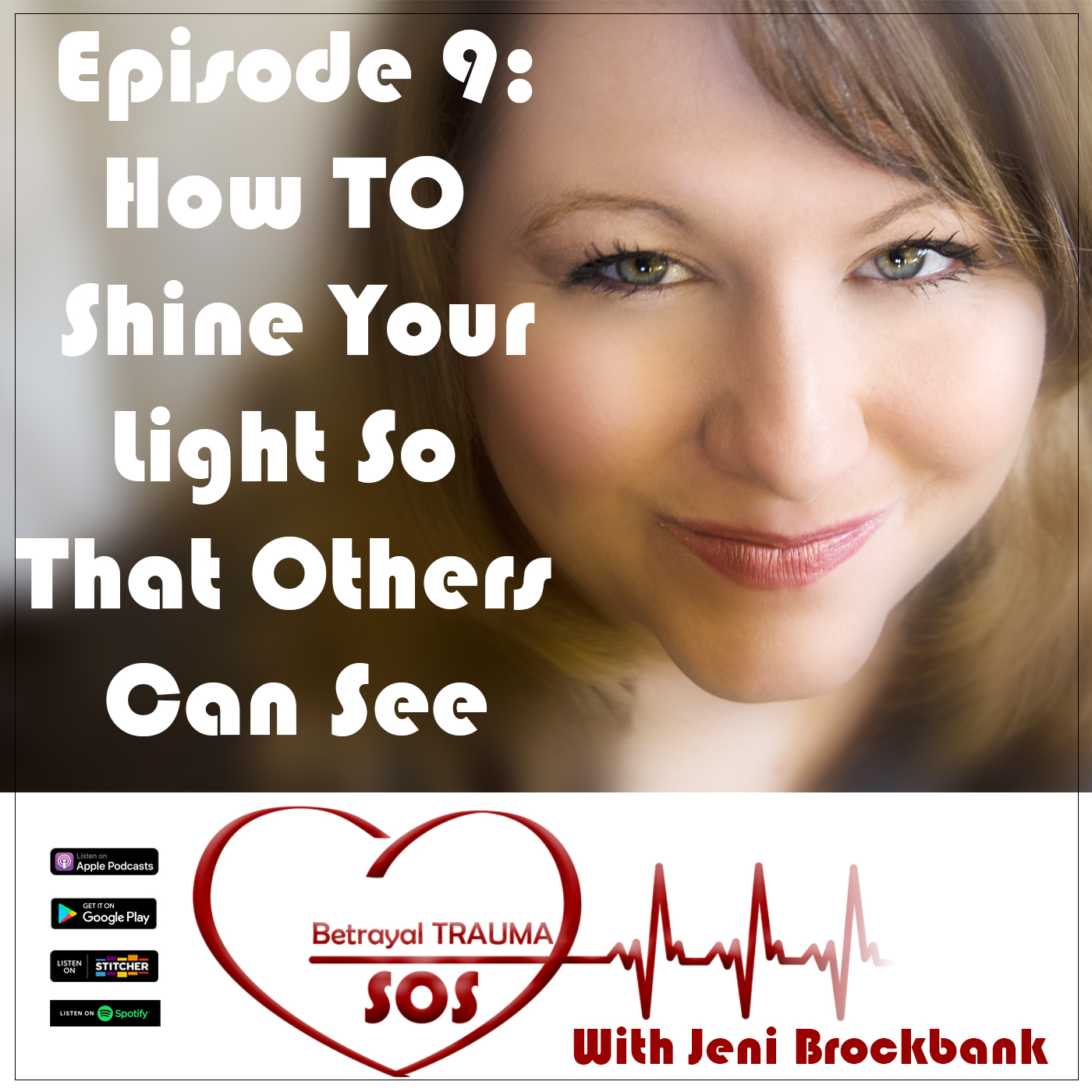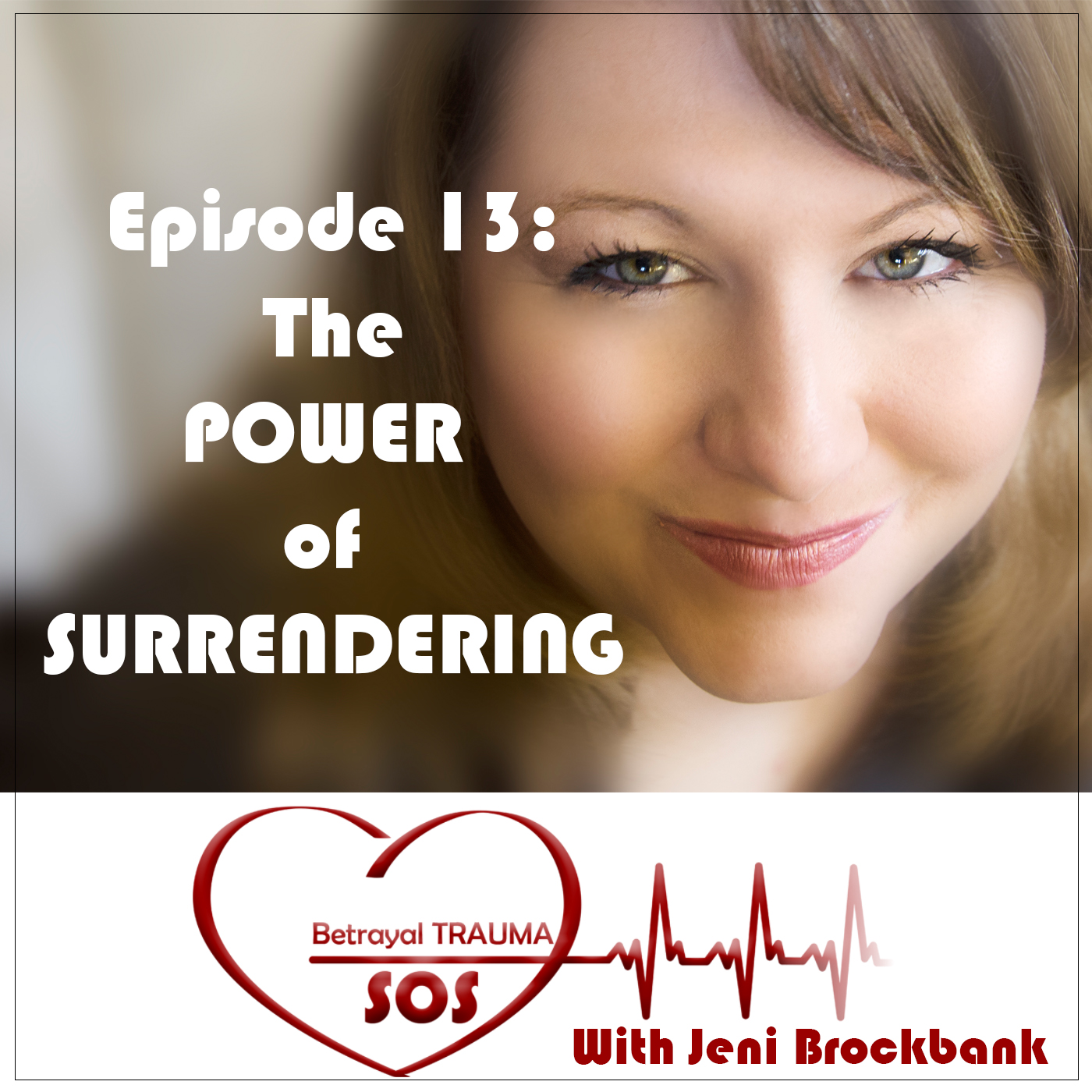Episode Transcript
[00:00:00] Speaker A: Take a breath, have courage and let go.
[00:00:07] Speaker B: You're listening to Relational Trauma SOS Her Wings Unfold Production Trauma survivors belong here.
[00:00:21] Speaker A: So I fly, fly, fly Past the hurt, past the goodbye with the wind in my chest and higher in my eyes I fly, fly, fly higher than every single light.
[00:00:46] Speaker B: If you enjoyed that opening song, Learning to Fly, we hope that you'll check it out and you can listen to this or purchase it even on all major platforms and and we also have a lyric video of it on YouTube.
Welcome to Relational Trauma SOS. My name is Jenny Brockbank and I am the Executive Director of Her Wings Unfold, a nonprofit that helps women heal from relational trauma. I am also a Certified Victims Advocate.
We want to welcome listeners from Pakistan, Salt Lake City, Utah and Indonesia.
I'm looking forward to delving into healing spiritual trauma as survivors.
Stay tuned to the end because I will be sharing some free resources for personal exploration.
But first, for those who don't know, Her Wings Unfold is the parent organization for TS Twelveanon, the first ever truly trauma sensitive 12 step program.
Meetings were open to the public about seven weeks ago and we are thrilled to see growth.
We currently have two betrayal trauma meetings, one on Thursday evenings at 7pm Mountain Standard Time and one on Tuesday mornings at 10am Mountain Standard Time.
We have a meeting for those with loved ones with a personality disorder and or who are emotionally immature and that would meet Sunday nights at 8pm Mountain Standard Time and a general meeting on Mondays at 8pm Mountain Standard Time. All current meetings are via Zoom and we plan to add more.
So here's your invitation to join us for a meeting very soon.
We're excited to share that TS12 and on is is expanding and we're beginning the process of adapting our general book to include editions tailored for specific communities because our Betrayal Trauma community is growing faster than any other community.
We're thrilled to announce that a Betrayal Trauma Focused edition is now in the works.
Stay tuned for more updates.
She's been hurt.
Her trust was shattered, her world turned upside down, and yet she still hopes for healing for safety.
At Her Wings Unfold, we're creating a women's retreat for survivors of relational trauma. A safe place to rest, to be understood and to begin again.
But we can't do it without you. Your gift today can sponsor a survivor's seat at the retreat and remind her that she's not alone.
Visit herwingsunfold.org to donate.
Help her heal. Help her fly.
[00:03:35] Speaker A: In the light of the day. She's rising with strength forged from sorrow and flame she's walking through fire with a heart made of gold she's done being caged and her wings unfold.
[00:03:55] Speaker B: If survivors of relational trauma could set a relationship status with God, many would quietly choose. It's complicated because trust, even with God, can take time to rebuild. Have you ever, like me, said something like, hello, God, it's me.
Are you there?
If so, then you are not alone.
Trauma survivors often have hard questions for the divine. For instance, we might ask, am I hearing you correctly?
Do you see how hard this is?
Why didn't you protect me? And more, there is nothing wrong with curious questions for God.
Maybe he feels distant now. Maybe you wonder if he's silent or if he was absent in the moments you needed him most.
Maybe you're not sure you can trust him like you once did.
If you've ever felt that way, you're not alone. These feelings aren't a sign that your faith is broken. They're a normal human response to deep pain. For many survivors, the relationship with God becomes exceedingly complicated. And that's okay. Trust, even with him, takes time to rebuild.
It took me a long time to come to my own conclusion that it's alright to be curious with God.
Maybe some here will relate with my experience.
I once thought that if I asked God the hard questions that it meant that my faith was lacking. But I've come to believe that it takes faith and humility to approach God with genuine, open, honest, heartfelt curiosity.
I deeply value working through hard things in all relationships. And come to find out I want an actual relationship with God as well. So when I look at it that way and that all relationships have hard things, then I want to look at it like I want to work through this hard thing that is going on with God.
So for me, I've come to learn it's okay to bring our curious or hard questions to God. And in fact they're a valid and even vital part of our spiritual journey.
While this program in TS12, 9 and just what we do in general is non denominational, I want to bring in something from the Old Testament because it's very relevant here.
Let's chat a bit about Job. And surely you'll remember Job if you do study the Old Testament. And Job went through so many trials and they were just one after another after another. And basically he lost almost everything, his children and his flocks. And just it was just so devastating, one after another, what he had lost.
The neat thing about Job, though, is that he was not afraid to ask God the hard questions.
Job voiced his anguish, his confusion, and even his frustration directly to God, refusing to pretend everything was fine.
And here's the fascinating part to me is that God didn't reject him for it. And instead their dialogue became a turning point in Job's story. And eventually he even saw the Lord, which to me is a true testament that God was looking for a relationship with Job and he was looking for a way to reveal himself to Job.
I believe that that translates to each of us.
I once thought that Job lacked faith for asking God the hard questions, but now I see that he turned directly to the source and was even blessed for it.
For me, healing relationship with God starts with coming to understand my worth to the God of my understanding.
An anonymous friend of mine said, quote, when I truly accepted my worth, that isn't created or earned.
I was open to what God was saying all along, that I was beloved.
Coming to know worth in God's eyes can be a tender and often surprising part of the healing journey. Trauma can leave a heart questioning whether we matter, whether we're seen, whether we are loved without condition.
In the often slow work of rebuilding trust, moments may come when God's gaze feels less like judgment and more like recognition and holding.
These glimpses of worth often emerge in quiet ways. Something written or a song that speaks directly to the soul, the warmth of creation on a walk, a sense of being held in prayer, creating something, etc.
Over time, such moments stitch together into a deeper knowing that identity is not defined by what has been endured or lost, but by the unchanging love of the divine.
When we come to know our worth, trust can begin to root again, not usually all at once, right, and not without questions, but with the steady assurance that our worth was never absent, even in the hardest seasons.
I'll suggest a few activities that might help each of us explore healing our relationships with God.
Some of you might know that step 4 in trauma sensitive 12 steps or TS12 and on can work a bit differently. And while people can do a traditional step four, there's also some some variations. And people can work step four according to where they fall in a trauma model.
So for a refresh, there are three stages of a trauma model, at least the one that we follow. Stage one is safety and stabilization. Stage two is grief and mourning. And stage three is integration and growth.
So I'm going to suggest a few activities to participate in that can show how participants might look at healing relationship with God according to where they relate with in a trauma model.
And first, I want to say this can look all sorts of different ways. There's no right or wrong way to move forward or to move towards healing.
So the following are suggestions only and are things to consider.
So let's start with stage one. And by the way, all of these are listed on the ts12anon.org website site. There is a section for working step four inventories.
And so this would be under the stage one section. And this, this section is called God and Me and honest Exploration.
And I'll tell you that that we have a free PDF of this.
You can go to the website and click and and print it out if it's helpful or you could kind of work through it on your own and I'll explain how you would do that.
In this activity, you'll draw two overlapping circles to map your experiences.
The first circle is the safe circle and in this circle you'll write or draw moments, situations or qualities of God as you understand God that feel safe to you. In the second circle or the unsafe or uncertain circle, you'll write or draw moments you experiences or qualities. And these could be perceived or real that feel unsafe, painful or unclear.
In the overlapping space between the circles include anything that feels mixed where you experience both safety and uncertainty.
After doing this, we then encourage participants to maybe look and to see what they learned and what observations they had.
If you print out the PDF, there's some specific questions that are self guiding, but you can also do this on your own and just kind of journal about it.
So moving on to stage two, work in healing a relationship with God. And again, stage two is grief and mourning.
For this activity we have a new activity. Again, it's new. It is also on the website ts12anon.org and again this would be under step four.
And then step four you could, you would select stage two inventories.
And this is a suggested activity that follows a pattern of what we refer to as lament in the Old Testament.
So basically in the Old Testament there are many examples of lamenting and we even have an entire book of lamentations.
There are laments in the book of Psalms and more. The basic pattern for a lament is four parts and stage one is that we turn toward God.
An example of this is from Psalm 102:1 where it says, hear my prayer, Lord, let my cry for help come to you.
And then in stage two we pour out our complaints.
So we will tell God what feels wrong, unjust, painful or confusing.
And an example of this is from Psalm 88:14 where it says why Lord do you reject me and hide your face from me?
And in stage three, we ask for help.
An example of this might look like this from Psalm 13:3, where it says, look on me and answer, lord, my God, give light to my eyes.
And then the stage four is express trust or hope.
And an example of this is from Lamentations 321 22, when it says, yet this I call mind, and therefore I have hope. Because of the Lord's great love, we are not consumed.
If someone were to be working on stage three of healing, which is integration and growth, I'll suggest an activity that is listed on the TS12 9 website for working step four, and that is an angel timeline. There's no printout for this one, and you'll see why. The angel timeline is a really powerful way to visually explore the landscape of life's experiences, honoring both the challenges endured and the grace received along the way.
So we begin by drawing a horizontal line across a large sheet of paper. And I mean, like we're talking like butcher paper or something like big, big sheet of paper.
And on this we'll mark significant years of life or stages or events.
And above the line we'll record positive milestones. So moments of joy, connection, accomplishment, things like graduating or finding a supportive friend, having a baby or discovering a passion, etc. And below the line, we'll note the hardships, losses, traumas, or difficult transitions that have left their mark.
And really we could just do the timeline just like that and end there. But the angel timeline, the angel.
There's a variation of an angel timeline, basically, where you can mark moments when help arrived in ways that felt guided, whether through earthly angels offering kindness, guidance, or unexpected support, or through experiences of divine intervention or spiritual presence.
For these, we might choose a special symbol like an angel wing or a bell or a halo, or whatever speaks angel to you or whatever divine presence you might believe in some kind of a symbol to mark that. And we place those near the related events, and that could be positive or hard to where maybe even in hard events, we received the help that we needed.
When the timeline is complete, step back and just kind of reflect on the patterns that emerge.
I will say that I think this is most helpful to be presented to someone to share, someone who could maybe offer insight. And that could be a therapist or a support guide. That's what we prefer to call people who might act more in a sponsor role.
It could be a group of friends or group therapy or just something to where there's an outside opinion, outside help to see where patterns emerge.
The beauty of a timeline is that it not only validates the pain of the journey, but also illuminates the threads of hope and connection that have shaped the path toward healing.
For me, I've learned that it's alright to bring honest and even very messy questions to God. They're not signs of weakness, faith or a broken spirit. They're part of being real and in relationship with any being.
Across centuries and traditions, people have poured out their hearts in raw prayers, in laments and quiet silences.
However, God has understood that presence can be big enough to hold each question, each ache, each unspoken word.
Thinking again about Job, he lost almost everything and did not hide his pain. He spoke honestly about his grief, confusion and frustration not to push God away, but because he still longed for connection. And he longed for answers, much like I have felt, and I'm sure many of you have felt that way as well.
In Job's story, I see a reminder for us that showing up with our friends full unfiltered selves can be an act of courage and even faith.
Even if the answers don't come right away or they don't come at all. The act of turning toward God with questions, tears, or even silence matters.
And healing relational trauma with God, well, that matters too.
[00:18:26] Speaker A: Take a breath, have courage and let go.
[00:18:33] Speaker B: We are so glad that you joined us today on Relational Trauma sos. We would love your feedback and welcome you to reach out to us on either of our websites for wingsunfold.org or ts12non.org.
[00:18:55] Speaker A: With the wind in my chest and fire in my eyes Please donate.
[00:19:01] Speaker B: To help women find hope and Healing.
[00:19:04] Speaker A: To find their wings higher than every.
[00:19:08] Speaker B: Single life Trauma survivors belong here.


